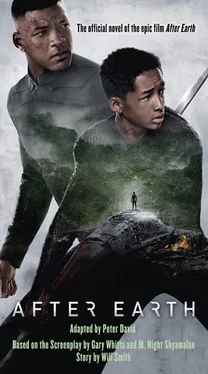Yada leaves, as she said she would. The damaged Rangers in the medicenter smile when they see him but seldom speak to him. He can hear them whisper things: “It’s Blackburn.” “Better cut out the jokes.” “Don’t want to hurt his feelings.”
In the gym, Jon’s promoted to the red machines. He finds them a challenge, just as he found the green machines and the yellow machines a challenge at first. But he’s getting stronger. He can see that. He believes his doctors see it, too.
Pretty soon he’ll be fit for duty.
Jon has another dream.
He’s standing in the desert, watching Explorer I lift off from an airfield outside Nova City, its destination a world in another star system. Jon is eight, nine, perhaps ten years old. His father’s hand rests on his shoulder.
“I wish my grandfather was alive to see this,” says Gregory Blackburn. “If not for him, none of this would have happened.”
Explorer I glints in the light of the first sun as it rises into the flawless blue of the sky. Higher and higher it climbs. Then it’s gone.
Jon’s father’s parents, Grandpa Masters and Grandma Sheila, are making whooping noises. Jon’s parents are embracing.
They are smiling, all of them. He knows now what that means. They’re happy .
When Jon wakes up, he finds himself looking at the ceiling of his room in the medicenter instead of the sky. The airfield, his parents, his grandparents… they’re gone.
But it wasn’t just a dream, he realizes. It really happened. He had forgotten, but now he remembers.
It happened .
He wonders about his father’s grandfather. Did I ever meet him? Did I know anything about him before my procedure?
He gets dressed and goes to the medicenter’s library, where he sits at a workstation near the transparent wall along the corridor and looks up his family’s genealogy.
Jon finds that his paternal great-grandfather, Elliot Blackburn, was born in 883 AE. As an adult, he became the spokesman for a group of engineers that made presentations to the Tripartite Council advocating the official exploration of neighboring star systems. After all, they said, the Ursa had been the cause of misery for hundreds of years. It made sense to settle a planet that would provide an alternative for those sick of the bloodshed.
Elliot Blackburn died without making much headway on behalf of his cause. However, his oldest son, Masters, picked up where his father left off. When Savant Ella Dorsey broached the idea of a space colonization program in 951, it was at the urging of Masters Blackburn.
Dorsey’s idea was opposed by both the Primus on religious grounds and the Prime Commander for reasons never publicly stated. However, Jon’s grandfather continued to speak in support of colonization to professional organizations and civic groups.
Finally, in 960, Brom Raige—who had become Prime Commander only a year earlier—tilted the Tripartite Council in favor of a space program.
Tähtiin Industries, which had been working privately with the Savant, possessed plans for an interstellar vessel. With the Council’s support, Tähtiin began developing what it called Explorer I .
Jon’s father, Gregory, had Explorer I in mind when he entered the terraforming program at Nova City University’s Thermopoulos School of Engineering. His dream, he said in his valedictory address, was to prepare a home for humankind free of the fear that had plagued Nova Prime for hundreds of years.
Jon’s mother shared this dream, though she took a different route to it. Inspired by her mother, a Ranger flier in the Varuna Squadron, Adabelle Bonnaire became one of the youngest pilots in the history of the Corps. Her goal, according to her Ranger file, was to helm an interstellar vessel to the first new human colony in almost a thousand years.
Jon’s parents met at a conference sponsored by Tähtiin Industries in 968. Gregory Blackburn was twenty-five at the time, a year older than his wife to be. They married a year later.
They didn’t realize their dreams, Jon notes. His mother didn’t helm Explorer I . His father’s terraforming program wasn’t needed. Yet on that airfield, they were happy that humankind was following the course in which they believed.
Jon has never aimed for the stars. His goal as a Ranger has been to destroy the threat represented by the Ursa on Nova Prime.
However, he has something in common with his forebears: He began by wanting humankind to be safe from fear.
Later that morning, Jon sees Doctor Gold. She smiles at him and asks, “How are you feeling?”
He isn’t sure how to answer that. He reminds her of his deficit in the area of emotion.
The doctor reddens. “Sorry. I guess I wasn’t thinking.”
“It’s all right,” he says, having learned that a blush represents embarrassment. “This is a new experience for you as much as it is for me.”
She smiles again. “Thanks for understanding. And allow me to rephrase the question: Have you noticed any changes in your mental state?”
He assesses himself along those lines. “I’ve been thinking a lot, more than I ever did before. About my family, for instance.” He tells her about his dream of the airfield and what he did afterward. “I wonder if I’m trying to replace feeling with thinking.”
“That’s interesting,” she says.
He looks at her. “Is it?”
“Well, yes, of course it is.” Then she adds: “Everything about you is interesting.” And she turns away from him to check the data on his holographic screen.
Something changes in her expression, but Jon can’t decipher the change. His tutorial covers only so much.
“Is something wrong?” he asks, venturing a guess.
Doctor Gold shakes her head—a negative response, he’s learned—and says, “Everything’s fine.” But she continues to study the data.
Then she runs out of screens. But instead of turning back to Jon, she turns away from him.
This behavior, too, was covered in the tutorial. “You’re uncomfortable,” he observes.
“No,” Doctor Gold says. “Just tired. I haven’t slept a lot lately.”
He’s seen his records. He had difficulty sleeping, too, after his parents were killed. “An inability to fall asleep may be the result of unresolved emotional issues.”
She looks up at him. “Where did you hear that?”
“It’s noted in my file.”
Doctor Gold laughs softly. “Right. You’re a smart guy, Jon.”
His records support her observation. He placed first in his cadet class in all measures of intelligence.
“Very smart,” Doctor Gold says. She places her hand on his and leaves it there.
In the tutorial, such behavior is described as an indication of emotional involvement. Jon asks Doctor Gold if he is reading her gesture correctly.
She takes her hand away. “You’re getting better at interpreting behavior, Jon, but in this instance you’re reading into it a little too much.”
“Then you’re not emotionally involved?”
“I’m part of the medical team assigned to your case,” she says. “Let’s leave it at that.”
He agrees to do so. After all, she’s his doctor.
As Jon was taught, he doesn’t look away from Doctor Gold. He intends to wait until she does it first.
But she doesn’t look away for a long time.
Jon is sitting at his usual workstation in the medicenter library, looking up more information on his family, when he feels a hand on his shoulder.
Looking back, he sees a tall, broad-shouldered man looming behind him. “Mind if I interrupt?” he asks.
“No, sir,” Jon says, rising from his chair.
His visitor is Prime Commander Raige. He and Jon met more than once before Jon’s procedure. That, too, is noted in Jon’s file.
Читать дальше












